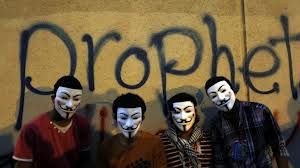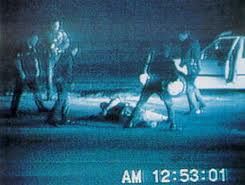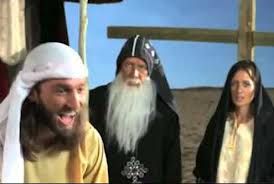
Media
A Bad Hollywood Video, the Middle-East Protests and the L.A Riots of '92
Media-induced effects
Posted September 13, 2012

The Middle-East is exploding again, this time over a really bad and vulgar Hollywood video on YouTube, portraying the Prophet Muhammed in a most salacious and corrupt light. It is a foreboding moment.
Just the other day, we marveled at the positive, liberating consequences of social media like YouTube, Twitter and Facebook. We praised their use in organizing freedom protests in police states like Egypt and Tunisia. We applauded the use of cellphone-generated demonstrations in Romania. Will the wonders of technology ever cease?
They cease. Wrong people with big money do wrong things. We get yet another glimpse into how media technology is but a quiver of tools to sway the masses for destructive political and ideological ends.

In reality, "the media" have always been Janus-like. The technology changes, advances, enhances, expedites and accelerates events, natural and un, human and non.
One merely has to recall the 1992 L.A. riots to inhale the sometimes uncontrollable, underappreciated power of the media. Think back to moments after the acquittal of the four LAPD officers who — weeks earlier, adrenalized and devoid of self-control and common sense, mercilessly beat the defenseless African-American, Rodney King. They were oblivious to the fact that their brutal assault was caught on video by an unseen bystander who sent it to TV news stations.
The public — even the first President Bush — was outraged by the video. In the wake of these violent images being repeatedly shown and punditized in L.A. and across the country, the expectation of a slam-dunk conviction of the police officers was cultivated and primed. When the white suburban police were acquitted by a white suburban jury, the media showed the video again and again and again. L.A. exploded, along with other U.S. urban centers for six days and six nights.
Only later did the public become fully aware of the complete King video tape, the one that was used at the (non-televised) trial — as opposed to the one they repeatedly saw in the media. The unedited version revealed King's (and his passenger's) provocative behavior.
And only later was it scientifically shown that a jury exposed to repetitions of the complete video would become numb to the violence and construct a nuanced, less inflammatory reaction and evaluation. This was the media effect the public and the rioters could simply could not understand.
Los Angeles to the Middle East. Video of police brutality, video of Prophet Muhammad fondling breasts. Parallels, comparisons. The media provides visuals and narratives that arouse the temperate and intemperate passions which fuel anger and action.
Do you remember the threats and assassination attempts on writers and artists who satirize or criticize the Prophet, like Dutch and Danish journalists, cartoonists, and filmmakers, or British-Indian author Salman Rushdie? People are combustible.
Middle-East protestors assume — and have been helped to assume -- that the U.S is responsible for the offending movie.

This craftless film, “Innocence of Muslims,” the trigger to red-faced, screaming rioters, was described by journalist Julian Borger in Britain’s The Guardian, thusly:
“The subject is religion but the style, production values and acting are reminiscent of gonzo, low-budget porn, a vast industry in southern California, where this movie appears to have been made.” Having watched the clips on YouTube I can fairly say that this assessment is spot on.
At this writing, the identified filmmaker is Sam Bacile, 56, who, in an interview with the Wall Street Journal said, "Islam is a cancer" and that he intended for the film to be a provocative statement condemning the religion. He identified himself as an Israeli Jew who wishes to expose Islam’s flaws to the world.
But this is instant media coverage of confused and confusing events: Sam Bacile may be neither an Israeli, or a Jew and maybe that's a phoney name. (according to journalist Jeffrey Goldberg of The Atlantic).
Now, what if the people behind this film are not American? What if they’re not Israeli, or Jewish? What if they're Arabs? What if they are politicos who have successfully designed and created another occasion to arouse Arab street passions against Americans?
We don't know yet.
Well-crafted images, words, and narrative fictions are more than enough to get the ball of violence rolling. It’s all too, too easy. The volatile nature and dangers of digital, social media are in clear relief. The world has been made more dangerous because it is just so pathetically simple to spread rumors, rouse passions, and draw blood.
The horrendous state of media literacy aside, the world needs a new paradigm for gathering and reporting the news, covered live or over the shoulder. The news media’s ability to report from any “ground zero,” is ironically part of the problem.
The problem, THE PROBLEM, is almost insoluble. How do you get people to stop using media tools as weapons? How do you get news agencies to sacrifice being first for being right? With education and laws? Too slow, way too slow.
Technology mutates too quickly, its allure is too seductive. It is the weapon of choice in the digital age, and may God have mercy on our cyber-drunk souls.



